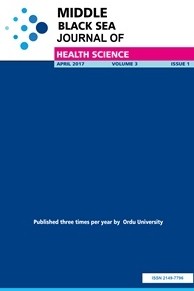The Effect of Women’s Family Planning Method Use on Worry Level
The Effect of Women’s Family Planning Method Use on Worry Level
family planning, worry women, nursing,
___
- Calikoglu EO, Bedir B, Yilmaz S, Aydin A. [Health knowledge of medical students about family planning and sexually transmitted diseases] Fam Pract Palliat Care. 2017;2(2):12-17
- Sultan S, Ali MM, Bardai SS, Kanpurwala MA, Punjwani FS. Knowledge, attitude, and practice of family planning methods among marrierd men and women. Journal Womens Health. 2018;7(3). doi: 10.4172 / 2325-9795.1000311
- Çalışkan BG, Doğan B, Olçum GG. The effect of age and educational status on the family planning method choice of women living in a rural area. Turkish Journal of Family Medicine. 2014;18(4):189-194.
- Çayan A. The relationship between the attitudes of married women aged 15–49 towards family planning methods and the contraceptive methods they use (Specialization Thesis). Aydin: Adnan Menderes University. 2009.
- Helvacioglu C, Daddeviren H, Kanawati A, Cengiz H, Ekin M. Public awareness level about the oral contraceptives. Bakırköy Tıp Dergisi 2018;14:53-6. https://doi.org/10.5350/BTDMJB.20170401101511
- Yanıkkerem E, Acar H, Elem E. Withdrawal users’ perceptions of and experience with contraceptive methods in Manisa, Turkey. Midwifery. 2006;22(3):274-284.
- Çiftçioğlu S, Erci B. Coitus interruptus as a contraceptive method: Turkish women’s perceptions and experiences. Journal of Advanced Nursing. 2009;65(8):1686-1694.
- Mumcu N. Examining the effect of traditional practices and beliefs on the use of family planning methods (Master's Thesis). Afyon: Afyon Kocatepe University. 2004.
- Türkiye Demographic and Health Survey (TDHS). (2013). Accessed: December 11, 2017, http://www.hips.hacettepe.edu.tr/tnsa2013/rapor/TNSA_2013_ana_rapor.pdf
- Türkiye Demographic and Health Survey (TDHS). (2018). Accessed: March 12, 2020, http://www.hips.hacettepe.edu.tr/tnsa2018/rapor/TNSA2018_ana_Rapor.pdf
- Meyer TJ, Miller ML, Metzger RL, Borkovec TD. (1990). Development and validation of the Penn State Worry Questionnaire. Behaviour Research and Therapy. 1990;28:487-495.
- Yılmaz AE, Gençöz T, Wells A. Psychometric characteristics of the Penn State Worry Questionnaire and Meta-Cognitions Questionnaire-30 and metacognitive predictors of worry and obsessive-compulsive symptoms in Turkish Sample. Clinical Psychology and Psychotherapy. 2008;15:424-439.
- Castillo C, Macrini L, Cheniaux E, Landeira-Fernandez J. Psychometric properties and latent structure of the Portuguese version of the Penn State Worry Questionnaire. The Spanish Journal of Psychology. 2010;13(1):431-443.
- Rodríguez-Biglieri R, Vetere GL. Psychometric characteristics of the penn state worry questionnaire in an argentinean sample: A cross-cultural contribution. The Spanish Journal of Psychology. 2011;14(01):452–463.
- Bottesi G, Martignon A, Cerea S, Ghisi M. Worry and associated cognitive features in Italian university students: Does gender make a difference? Personality and Individual Differences. 2018;126:38-43.
- İnegöl MA. Examining the role of anxiety sensitivity and intolerance of uncertainty as mediating variables in the relationship between attachment anxiety and pathological anxiety (Master's Thesis). Istanbul: Maltepe University. 2016.
- Ateşer GB, Güzel E, Kaya S, Aydın DS, Şahbaz N, Durmuş MK. Pregnancy protection method preferences of Turkish women. Okmeydani Medical Journal. 2017;33(4):241-246.
- Budak MŞ, Toğrul C, Balsak D, Sakar MN, Tahaoğlu AE, Akgöl S ve ark. The Evaluation Of Failed Contraception Methods And Causes In Elective Pregnancy Termination. The Journal of Gynecology - Obstetrics and Neonatology. 2015;12(3):106-109.
- Woods JL, Hensel JD, Fortenberry JD. Contraceptive withdrawal in adolescents: a complex picture of usage. Journal Pediatr Adolesc Gynecol. 2009;4:233–237.
- Özdemir H. The effect of family planning methods used by men on women's sexual life (Master's Thesis). Aydin: Adnan Menderes University. 2014.
- Jones RK, Lindberg LD, Higgins JA. Pull and pray or extra protection? contraceptive strategies involving withdrawal among us adult women. Elsevier Contraseption. 2014;90:416-421.
- Kaplan E, Zeyneloğlu S. The effects of women’s sexual satısfıctıon on theır marıtal accordance, whose spouses ımplementıng “coıtus ınterruptus” as the famıly plannıng method. Necmettin Erbakan University Faculty of Health Sciences Journal. 2018;1(1):10-17.
- Ercan EP. Satisfaction of adult women of reproductive age with the family planning methods they use and evaluation of the affecting factors (Medical Specialization Thesis). Istanbul.: Republic of Turkey Health Sciences University Haseki Health Application and Research Center. 2019.
- Yücel U, Güner S, Şen F. Evaluation of family planning service use in women aged 15-49 with children under two years old. medical sciences 2018;13(4):120-128.
- Gülsün M, Ak M, Bozkurt A. Marriage and Sexuality. Current Approaches In Psychıatry. 2009;1(1):68-79.
- Casey PM, MacLaughlin KL, Faubion SS. Impact of contraception on female sexual function. Journal of Women's Health. 2017;26(3):207-213.
- Yayın Aralığı: Yılda 4 Sayı
- Başlangıç: 2015
- Yayıncı: Ordu Üniversitesi
Gürkan ÇIKIM, Solmaz SUSAM, Mustafa GÖKSU, Fatih ÜÇKARDEŞ, Muhittin ÖNDERCİ
Analysis of YouTube Videos on Initiating Postpartum Sexual Life
Reyhan ERKAYA, Yeliz KAŞKO ARICI
The Impact of The COVID-19 Pandemic on Smoking Cessation
Emine Serap YILMAZ, Selen KARAOĞLANOĞLU, Nurhan KÖKSAL
Surveillance of Infection Control in Dental Settings During Covid-19 Pandemic
Mehmed Taha ALPAYDIN, Damla TORUL, Mehmet Melih ÖMEZLİ
Hastaneye Prenatal Bakım için Başvuran Gebelerde Risk Faktörlerinin ve Riskli Gebeliklerin Analizi
Hasan ULUBAŞOĞLU, Saime ŞAHİNÖZ, Turgut ŞAHİNÖZ, Pınar ULUBAŞOĞLU
Ebru CANAKCİ, Nilay TAŞ, Aysenur KİRDEMİR, Ismail ELMALİ, Melih ÜRKMEZ
The Effect of Women’s Family Planning Method Use on Worry Level
Aslı AYKAÇ, Banu TUNCAY, Ahmet Özer ŞEHİRLİ
Characteristics of Patients with Asthma Attack Followed in the Intensive Care Unit
Selen KARAOĞLANOĞLU, Özge BOSTAN, Serpil ÖCAL, Ebru ERSOY ORTAÇ, Ahmet DEMİR, Gül KARAKAYA, Ali Fuat KALYONCU
